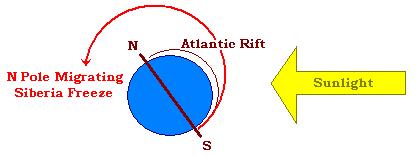 How is it that Siberia and much of Europe can be freezing in subzero cold, while the
US and Canada are basking in unseasonably warmth? Are they not on the same
latitude? We described, long before it appeared, an Earth wobble caused by the presence
of Planet X in the inner solar system. N Poles of magnets are anathema to each other, as each
hoses out magnetic particles and they want to either align side by side or end to end. As the
Earth is far smaller than Planet X, it is the lesser magnet and must accommodate Planet X,
which is the bully magnet. Thus, as Planet X swings around in place as it moves through the
Sun's magnetic field, turning its N Pole away from the Sun so it can align with the Sun's
magnetic field above the Ecliptic, it is forcing the N Pole of Earth to lean away during those
times when it faces the Sun and the passing Planet X.
How is it that Siberia and much of Europe can be freezing in subzero cold, while the
US and Canada are basking in unseasonably warmth? Are they not on the same
latitude? We described, long before it appeared, an Earth wobble caused by the presence
of Planet X in the inner solar system. N Poles of magnets are anathema to each other, as each
hoses out magnetic particles and they want to either align side by side or end to end. As the
Earth is far smaller than Planet X, it is the lesser magnet and must accommodate Planet X,
which is the bully magnet. Thus, as Planet X swings around in place as it moves through the
Sun's magnetic field, turning its N Pole away from the Sun so it can align with the Sun's
magnetic field above the Ecliptic, it is forcing the N Pole of Earth to lean away during those
times when it faces the Sun and the passing Planet X. It has been in the news within this past year that the magnetic N Pole is now migrating to Siberia, having left Canadian territory. Why would this be occurring, so rapidly? We have made much of the magnetic effect of the Atlantic Rift, which runs down the center of the Atlantic. Hardened magma, which hardens during pole shifts when the continents are ripped apart, aligns magnetically under the influence of the magnetic field, and thus this becomes essentially a magnet on the crust of the Earth. The regular global quakes, global shuddering when the plates of the globe are pulled forward or back as this magnetized Atlantic Rift is grabbed by Planet X, show a Face and Dark side pattern, when the Atlantic Rift is either facing or in opposition to Planet X as it approaches from the direction of the Sun. And where would that opposition point be? Siberia.
In essence, this is a projection of the Atlantic Rift as a magnet. It is wrapping around the globe, extending more than 180°, and curling over the horizon to encompass Siberia. The Earth's magnetosphere appears lopsided, when viewed from space, leaning away from the Sun, for a similar reason. It is stated that the solar wind blows the field away from the Sun. This is not the cause, but regardless of the exact mechanism, for the flow of magnetic particles to be swinging away from a larger magnet when in a side by side arrangement is a concept not unknown to humans. More than the particles are blown away. The poles are also pushed away. Where it would seem that this would make the N and S Poles of Earth revolve, with the globe, during the daily rotation, the influence of the Atlantic Rift on these matters prevails. When the Atlantic Rift presents its face to the Sun and to Planet X, which is in the process of turning its N Pole toward Earth, the effect is to create a bow on this surface magnet that goes over the horizon and pushes the magnetic N Pole of Earth into Siberia.
The Earth wobble that emerged in 2004, where the N Pole of Earth drew a figure 8 each day as it was alternatively pushed away from Planet X and/or allowed to bounce back, has become more extreme. Siberia is cold because when it turns toward the Sun during rotation, the magnetic pole that has become its resident is pushed away, and thus Siberia gets less sunlight. Canada and the US are basking for similar reasons. When they turn toward the Sun there is no N Pole influence to be shoved away. The Atlantic Rift is being griped, top to bottom, by Planet X and turned in such a way that the bow of the crustal magnet aligns in a comfortable way to the dominance of Planet X. The emerging N Pole of Planet X, swinging round to the right in a retrograde or clockwise manner, wants the Earth to fall to its side, toward the left, so the N Pole of Earth is as far away as possible. As the Earth is not yet torn from its allegiance to the Sun, it has dual directives, and tries to accommodate them both. Thus, while it remains upright and has not yet fallen onto its side, it leans somewhat in that direction, and thus the lopsided Winter temps in the northern hemisphere.